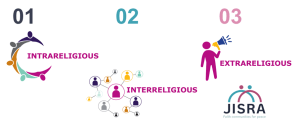Written by Matthijs van Pijkeren, Faith & Development advisor, Tearfund Netherlands
When thinking about religion and development, there are three points that need to be considered based upon research and our own practice. In the article ‘Unboxing Faith Based Actors (1)’ I spoke about the acknowledgement of the complexity and diversity of faith, religion and faith based actors and the willingness to understand each other. In this second part I want to zoom in on the narrative of Faith Based Actors and to point out they can be relevant in many themes.
A different narrative
When engaging in conversations with faith based actors (FBAs) it is necessary to understand that language matters. We need to acknowledge that FBAs sometimes use different words, use a different narrative, are motivated from their own faith. In other words, they might not be familiar with the language of ‘neutral’ or secular development actors. An example for this is the engagement of faith actors when it comes to climate change. When talking about the climate crisis, local or national faith actors might not know the Sustainable Development Goals or understand the Paris agreement. You can however engage with them on how their religion, religious scripture or religious practice refers to the environment, or creation, and how it refers to the responsibility of mankind to take good care of all creatures, great and small.
Intrinsic value
That is also why faith leaders, on local, national or global level should have an important role in tackling the climate crisis. Look for instance at the influence of the Laudate Si encyclical of Pope Francis, not only on the Roman Catholic Church, but far wider in linking the climate crisis with poverty and injustice. It can even be said that the ‘secular, modernist’ discourse of looking at our natural world needs correction by these faith based narratives that underline the intrinsic value of the natural world and natural resources.
Please note: there is a danger of instrumentalization. Faith actors can feel ‘used’ by secular actors for a western agenda. This in a time of polarization might alienate them from their own constituency, or prompt a defensive, ‘conservative’ response. However, religions and faith are not inherently conservative nor progressive. That is why taking the time for dialogue, conversations about each other’s values and finding a common narrative is so important.
Understand
This is also the approach of the JISRA programme (see `Unboxing Faith Based Actors (1)’) where we make a distinction between ‘intra-religious’, ‘inter-religious’ and extra-religious’ conversations. Intra-religious means working within religious communities challenging harmful norms and narratives based upon the own values and beliefs, empowering faith leaders to promote inclusivity. Inter-religious means working to foster dialogue and stimulate cooperation between religious communities from different faiths. And extra-religious means JISRA empowers religious actors to build bridges across religious divides to address topics together with secular, institutional or government stakeholders. In all of these conversations time is needed to understand each other.
(Different dialogues, JISRA)
Unboxing faith and religion
Faith and religion must be not be seen as just another aspect of the human experience, but as shaping the whole life. For many westerners, who have grown up in a highly individualistic, ‘rational’ society, it is easy to compartmentalize religion. To put it in a box. Even for many believers in western society, religion can be considered as something that you only practice on Sunday. However, for many people religion shapes their whole worldview, influencing what they think is important in life, family, work, economy, politics, identity. When engaging with faith based actors, some stakeholders tend to focus on a particular box, department or theme where religion is allowed to be of influence. E.g. Freedom of Religion and Belief, where it is obvious that religious groups are stakeholders. There is however an invitation to engage with faith based actors in many other areas, even when it doesn’t seem obvious. In our experience, involving faith leaders and actors in combatting Sexual and Gender Based Violence, in localisation of relief, in mental health and psychosocial care helps to get a more holistic approach that takes into account the whole human experience.
An invitation to dialogue
This then is the promise of engaging with Faith Based Actors. There are so many challenges in the world today that require global, national and local actors to work together and understand each other. Peace building in times of conflict, competition on natural resources, the climate crisis, the push to engage with local actors in humanitarian relief, the challenge of nationalistic/religious discourses to democratic values. In all of these, local, national and global faith actors are already active. They want to be taken seriously not despite their religion, but because of that identity. In all of these challenges, a dialogue on the values that drive people will be more than just interesting, it will be a necessity.






